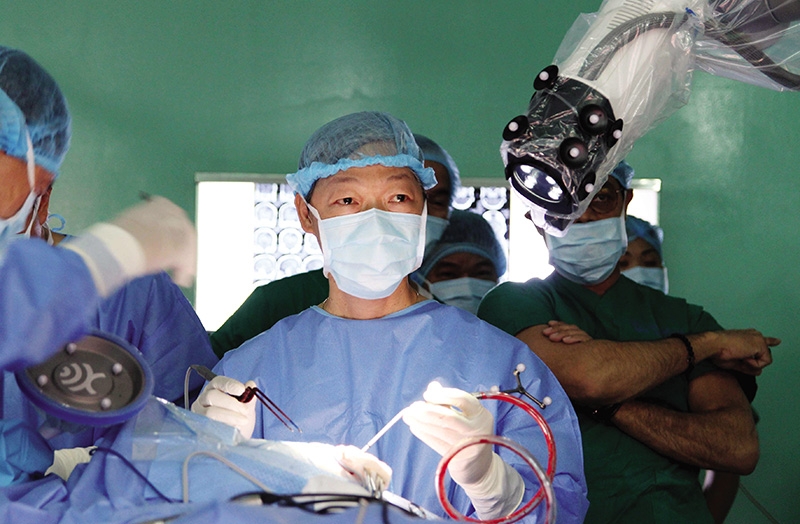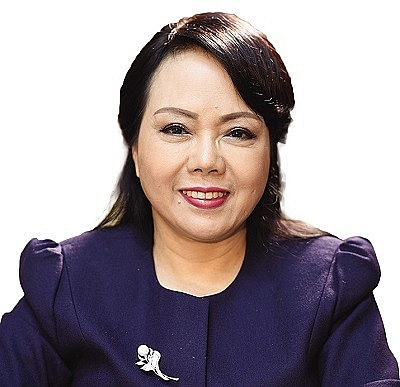Hospitals leap on the digital bandwagon
 |
| The use of AI will vastly improve both patient safety and the hospital experience, Photo: Le Toan |
Hoan My Medical Corporation, the largest and most experienced private-run medical group in Vietnam, was honoured at last week’s Hospital Management Asia 2019 event in the country with the Innovations in Healthcare Technology Project award. This award, for incident reporting and learning systems, partly illustrates the trend of technology investment among hospitals across the country.
According to Hoan My, medical incidents happen often and are the third killer, just behind cancer and heart attacks. “In high-income countries, one in 10 patients is harmed while receiving hospital care, while in low and middle-income countries, the adverse event rate sits around 8 per cent (83 per cent were preventable, and 30 per cent were associated with death of the patient),” said Le Thi Anh Thu, group chief medical officer of Hoan My. “Low reporting of incidents come from the Asian culture of reporting. Thus, we have developed the HM115 with a hope to create a digital platform to support the change in the reporting culture at hospitals, and thus possibly preventing regrettable incidents.”
Hoan My was one among hundreds of Vietnamese privately-run and state-run hospitals to attend the Hospital Management Asia 2019 to showcase technology application and learn experience from their partners amid wide influence of Industry 4.0 in enhancing patient satisfaction and improving outcomes.
Along this trend, the likes of FV Hospital, Vinmec Healthcare System, Hanh Phuc International Hospital, City International Hospital, and American International Hospital, among others, have also been heading towards healthcare digitalisation.
Established in 2014, City International Hospital is piloting the application of AI in diagnosis of common diseases, while planning to focus on telemedicine in the near future.
According to Siemens Healthineers, the healthcare industry is facing constant alterations. Digitalising the market and rapid technological progresses are accompanied by changing regulatory demands, cost pressures, and growing customer expectations. Highly promising technology is opening up previously unimagined opportunities, thanks to exponential growth in computing power, huge memory capacity, and growth in networking.
In addition to this, the trend is reinforced by the Vietnamese government’s policies towards promotion of technology in the healthcare sector. Last year, the Ministry of Health (MoH) marked an important milestone when it decided to pilot the AI application in cancer treatment at
National Cancer Hospital, Oncology Hospital Ho Chi Minh City, and Phu Tho General Hospital, by using AI from IBM Watson for Oncology.
Now, the important focuses of the Vietnamese healthcare industry continues to include IT application from Industry 4.0, together with finance, infrastructure, and public-private partnership development.
To this end, the MoH encourages hospitals to apply technology in their performance in order to increase efficiency.
“Together with the achievements made over recent years, Vietnam continues the reform of the healthcare system. And we want to learn from countries in the development of the healthcare sector and encourage private investment into this path,” said Minister of Health Nguyen Thi Kim Tien.
Taking the same view, groups such as GE Healthcare, Siemens Healthineers, Abbott, Sodexo, Sunway Medical Centre, and E-Healthcare Vietnam are seeking new opportunities via partnerships with hospitals. They are having discussions on the latest healthcare technology available and that already being used in the region; the use of AI and digitalisation in improving patient safety and outcomes; and debating what the future holds in terms of new technology.
Siemens Healthineers in particular is working on the creation of something the groups calls ‘value partnerships’, under which they not only provide equipment, but look at optimising operations today, expanding new capabilities tomorrow, and advancing the level of innovation. Similarly, Sodexo Vietnam, part of a global organisation spanning 72 countries, is looking to work with hospitals to deliver a full range of on-site integrated facilities management services deployed across corporations, healthcare, and education.
| Nguyen Thi Kim Tien - Minister of Health
In recent years, the Ministry of Health has undertaken health sector reforms towards universal health coverage, in which healthcare service quality is a key component that secures patient and population safety. In order to assure healthy status for over 96 million people, we are working on a patient-centred approach that provides safe and quality services as well as patient satisfaction. We have implemented the following solutions: focusing on service quality, upgrading the physical infrastructure, health financing, and more. Specifically, to upgrade the physical infrastructure, we deploy a programme on green and clean hospitals, strengthening IT application, and implementing electronic medical records. Regarding health financing, health insurance coverage in Vietnam stands at 89 per cent, with a state budget subsidy to purchase health insurance cards for the poor and nearly poor. The scope of the health insurance benefits package is relatively generous compared to the premium, including drugs, and treatment costs for some severe and high-cost diseases such as cancer and organ implants. In addition, we have also arranged to provide request-based services in hospitals in order to mobilise social resources and diversify modes of service provision. Although Vietnam has been rated as a low-middle income country with resource constraints, the Vietnamese government has made tremendous efforts in the protection and care of its people. However, besides initial gains and results, we will focus on enhancing quality of care at the grassroots level: continuing to transform provider payment methods; developing a clinical auditing system; and working towards independent evaluation of hospital services with published evaluation results, linked to health insurance reimbursement. Nguyen Thuc Anh – CEO Hanh Phuc International Hospital
Hanh Phuc International Hospital is the first Singaporean-standard hospital in Vietnam. Having been operating since 2011 as a private-run hospital, Hanh Phuc has strong expertise in healthcare for women and children. We are paying attention to technology application in our operations. Since the early days, we have run health information systems. Last year, Hanh Phuc also began operation to facilitate electric medical record system. Later this year, we plan to provide customer relationship management via mobile apps that enables us to keep track of each customer on a micro and a macro level, thus timely get their feedback and a picture of who patients are overall. In regard to international co-operation, we have a partnership with Singapore’s Thomson Medical Centre, and often gain experience from regional partners to increase operational efficiency and service quality. We now have one hospital in the southern province of Binh Duong, about 10 kilometres from Ho Chi Minh City, and two satellite clinics in the city. We will focus investment much more in improving expertise and quality rather than physical expansions in the near future. Tran Quoc Bao - Planning and marketing director City International Hospital
The state-of-the-art City International Hospital in Ho Chi Minh City is part of Hoa Lam Shangri-La High-Tech Health Care Park. Offering technology together with innovation, the hospital is the first private multi-disciplinary facility licensed by the Ministry of Health, and complies with or exceeds all national health and safety requirements. Technology application is now an important trend in hospitals. It helps increase accuracy of diagnosis, cut cost burdens for customers, and speeds up turnaround time. We now apply online-booking, and more importantly, we are piloting the application of AI in diagnosis of common diseases. In the future, we will move faster with technology in our operations. One of the focuses is telemedicine for certain diseases between the hospital and our patients, and telemedicine between our hospital and doctors elsewhere. To reach out to patients, we will open a mini clinic in October, and will expand the network of mini clinics in Ho Chi Minh City and the southern region in the future. By co-operating with PharmaCity, we aim to open one mini clinic every two months. |
What the stars mean:
★ Poor ★ ★ Promising ★★★ Good ★★★★ Very good ★★★★★ Exceptional
Related Contents
Latest News
More News
- Hermes joins Long Thanh cargo terminal development (February 04, 2026 | 15:59)
- SCG enhances production and distribution in Vietnam (February 04, 2026 | 08:00)
- UNIVACCO strengthens Asia expansion with Vietnam facility (February 03, 2026 | 08:00)
- Cai Mep Ha Port project wins approval with $1.95bn investment (February 02, 2026 | 16:17)
- Repositioning Vietnam in Asia’s manufacturing race (February 02, 2026 | 16:00)
- Manufacturing growth remains solid in early 2026 (February 02, 2026 | 15:28)
- Navigating venture capital trends across the continent (February 02, 2026 | 14:00)
- Motivations to achieve high growth (February 02, 2026 | 11:00)
- Capacity and regulations among British areas of expertise in IFCs (February 02, 2026 | 09:09)
- Transition underway in German investment across Vietnam (February 02, 2026 | 08:00)




 Tag:
Tag:




















 Mobile Version
Mobile Version